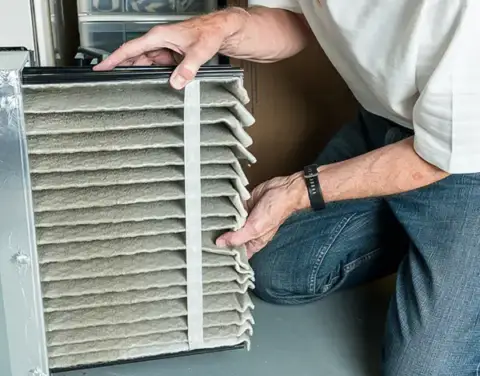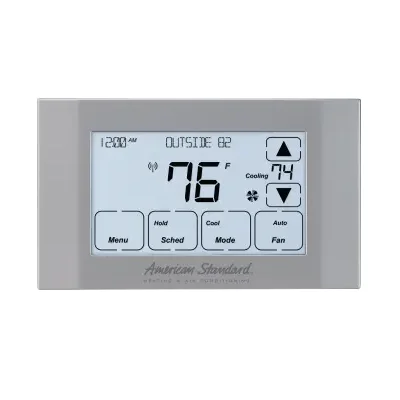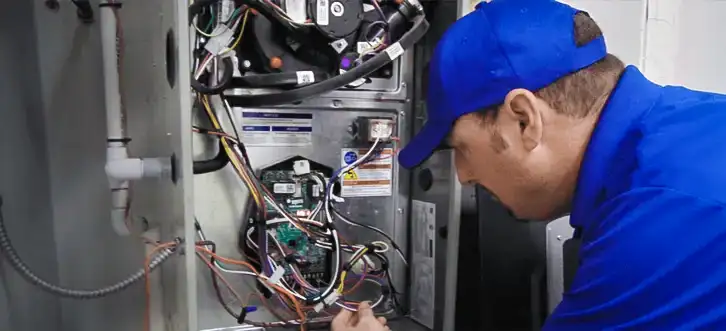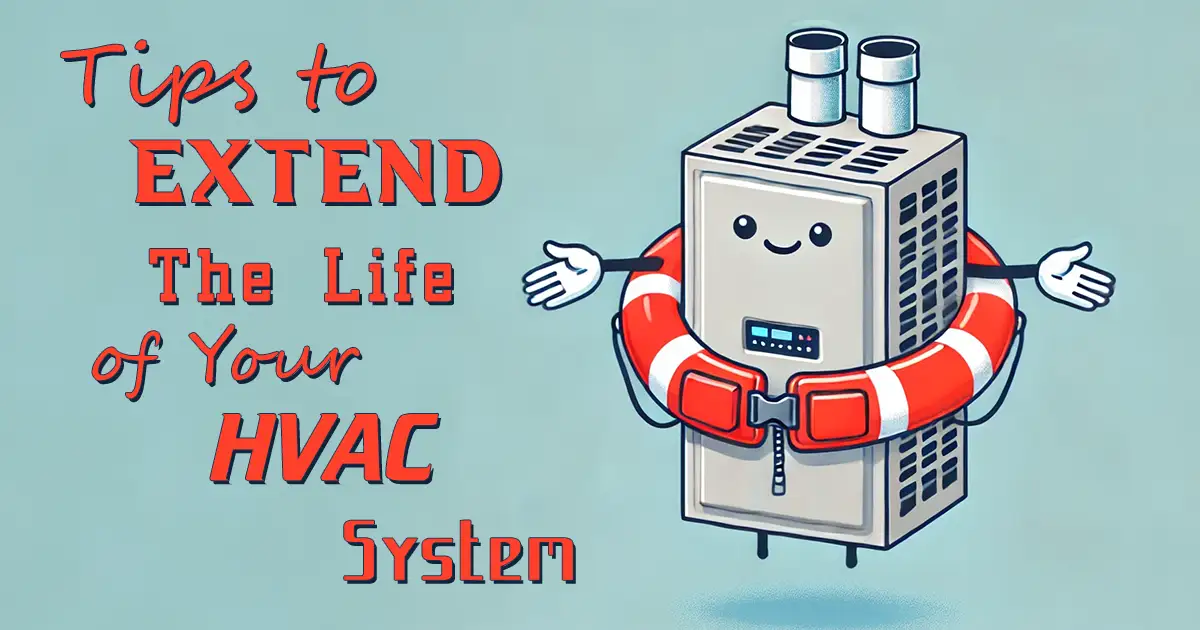Like any hardworking appliance, your HVAC needs a little TLC to perform at its best. With the proper care, an HVAC system can last well over a decade, saving you significant costs in replacement and energy bills.
This month, Greers Ferry Heat & Air will explore some essential, practical tips for extending the lifespan of your HVAC system. Not only will these tips help keep your home comfortable, but they’ll also help you save money in the long run.
Your HVAC System’s Lifeline
Regular preventive maintenance is one of the best ways to extend your HVAC system’s life. Think of this like an annual check-up at the doctor: it’s a chance to catch any minor problems before they become big, costly issues.
The HVAC technicians at Greers Ferry Heat & Air are trained to spot potential issues in your unit… like worn-out parts, loose connections, clogged drain lines, and airflow problems. By catching these early, we help you avoid sudden breakdowns and ensure your system runs at peak performance.
Why it matters: Many issues might seem minor but can cause significant damage over time if left untreated. Regular inspections also keep your warranty valid—many HVAC manufacturers require annual professional servicing as part of their warranty terms.
DIY Maintenance Checks Between Tune-Ups
Our customers trust us for their professional inspections, but in between tune-ups, we recommend they conduct simple maintenance checks as well. We recommend looking for anything unusual, such as odd sounds or smells, inconsistent heating or cooling, or any visible dirt buildup.
Keep an eye on your energy bills—if they spike suddenly without a good reason, your HVAC might not work as efficiently as it should.
Quick Tip: Listen for clanking or grinding noises and note any new, persistent smells from the system. These could be early warning signs that need a professional’s attention.
Air Filters: Simple but Powerful

Your HVAC’s air filter traps dust, pollen, pet dander, and other particles, preventing them from clogging your HVAC’s inner workings. Over time, however, filters get dirty, reducing airflow and forcing your HVAC to work harder.
We recommend changing your filter every 30-90 days depending on factors like the type of filter you use, whether you have pets, and if anyone in your home has allergies.
Why it matters: Dirty filters restrict airflow, which strains the HVAC and can lead to overheating and wear down internal parts faster. Keeping your filters clean reduces energy usage and ensures the system’s longevity.
Choose the Right Filter Type
Not all filters are created equal. Some filters, especially high-MERV-rated ones, can restrict airflow if your HVAC system isn’t designed for them. For most Greers Ferry homes, a MERV rating between 8 and 12 balances air quality and airflow efficiency.
Quick Tip: If you’re unsure which filter to choose, give us a call. We can determine the best filter for your system.
Work Smarter, Not Harder
Your thermostat can make or break the efficiency of your HVAC system. By setting it correctly, you can reduce strain on your HVAC and save on energy costs.

Programmable thermostats allow you to set schedules that automatically adjust the temperature based on when you’re home or away. Smart thermostats take this further, learning your preferences and adjusting accordingly. Both options prevent your HVAC from running unnecessarily, reducing wear and tear.
Why it matters: Constantly adjusting your thermostat manually can lead to erratic temperature changes that make your system work harder. Setting a consistent schedule helps your HVAC run more smoothly, reducing the risk of breakdowns.
Avoid Dramatic Swings
Many people think they need to crank up the heat when it’s cold outside. However, this is a mistake because extreme temperature changes can overburden your HVAC system.
Instead, aim for moderate adjustments and try not to set your thermostat more than 10 degrees lower or higher than the usual setting.
Quick Tip: In the winter, keep the thermostat at around 68°F during the day and lower it slightly at night. In the summer, aim for around 78°F when you’re home.
Don’t Block the Flow
Your HVAC needs enough airflow to perform properly, so you should always make sure that nothing is blocking your vents or the area around your system.
Blocked vents force your HVAC to work harder to distribute air throughout the house. Avoid placing furniture, curtains, or other large objects in front of vents, as this can disrupt airflow and lead to uneven temperatures in different rooms.
Why it matters: Poor airflow makes your HVAC work harder and can lead to hot and cold spots in your home, decreasing overall comfort.
Maintain a Clutter-Free Furnace Area
The area around your furnace must stay clear to ensure good air intake and reduce fire hazards. A good rule of thumb is to keep at least 18 inches of space around the furnace and other HVAC components.
Quick Tip: Regularly check your vents and furnace area, especially before peak heating or cooling seasons, to ensure nothing is blocking airflow.
Less Strain on Your System
Making minor improvements to your home’s insulation and overall energy efficiency can go a long way in helping your HVAC system work more efficiently.
Sealing gaps around windows, doors, and other potential leak points can prevent air from escaping, making it easier to maintain a consistent indoor temperature. Insulating your attic and walls can further reduce heat loss in winter and keep cool air inside in summer, reducing the strain on your HVAC.
Why it matters: A well-insulated home reduces the need for constant heating or cooling, which can help extend your HVAC system’s life.
Shade the Outdoor Unit
If you have an outdoor unit, protecting it from direct sunlight can improve its efficiency. Trees, awnings, or shade structures can help lower the temperature around the unit, allowing it to cool more effectively. Just be sure to leave enough space around the unit for good airflow.
Quick Tip: Keep plants and shrubs trimmed back to allow at least two feet of clearance around the outdoor unit.
Ductwork: The Hidden Component
Your ductwork significantly affects how well your HVAC distributes air throughout your home. Regular duct maintenance can improve system efficiency and prevent unnecessary strain.
Leaks in your ducts can lead to significant energy loss—as much as 20-30% in some cases. Over time, leaky ducts make your HVAC system work harder to compensate, reducing lifespan. Regular inspections and sealing of any leaks can improve airflow and help maintain consistent temperatures.
Why it matters: Properly sealed ducts allow air to flow efficiently, reducing the workload on your HVAC and helping it last longer.
Professional Duct Cleaning
Dust and debris can accumulate in ducts over time, reducing airflow and potentially leading to respiratory issues. While most homeowners only need duct cleaning every few years, it’s imperative if you’ve recently renovated, have pets, or notice an unusual amount of dust around your vents.
Quick Tip: Look for signs like dust buildup around vents, a drop in airflow, or increased allergy symptoms as indicators that duct cleaning may be necessary.
Don’t Wait for a Breakdown
A proactive homeowner can avoid unexpected breakdowns and costly repairs by calling Greers Ferry Heat & Air if they notice a concerning issue.
Ignoring minor issues like strange noises, inconsistent heating, or higher energy bills can lead to more significant problems. When you notice something unusual, don’t delay… call us and schedule a professional inspection as soon as possible to prevent minor issues from escalating.

Why it matters: Timely repairs help your HVAC run more efficiently and prevent minor problems from damaging more expensive components.
Let The Professionals Handle It
While some homeowners may be comfortable with basic DIY maintenance, most HVAC repairs should be left to your friends here at Greers Ferry Heat & Air. DIY fixes can sometimes void warranties or create additional problems if done incorrectly.
Quick Tip: If you’re unsure about a repair, calling in a professional is better than risking costly mistakes.
Final Thoughts
It doesn’t have to be overly complicated to maintain your HVAC system year in and year out. However, it does take some commitment. With regular maintenance, filter replacements, smart thermostat use, and attention to airflow, you can keep your system running smoothly for years.
If you are ready to give your HVAC system the care it deserves, schedule a tune-up with Greers Ferry Heat & Air today! Our professional technicians are here to help you maximize your system’s efficiency, reduce energy costs, and enjoy reliable comfort in every season.
Call us at (501) 825-7295 to schedule your appointment and experience peace of mind with a well-maintained HVAC system.

